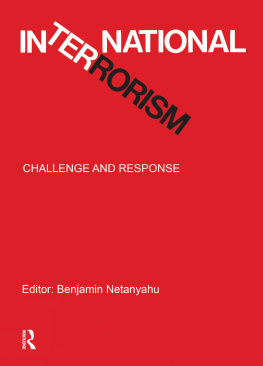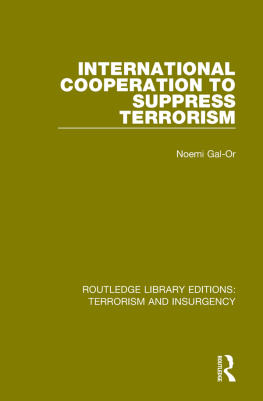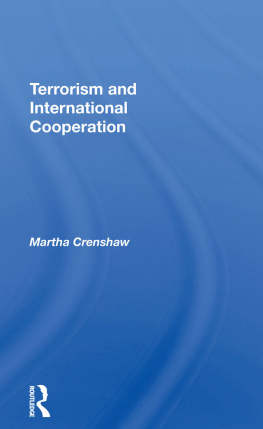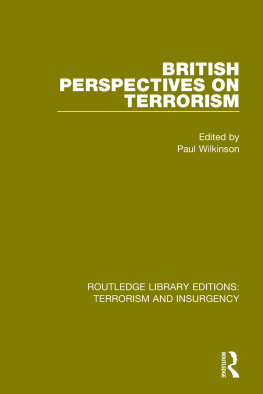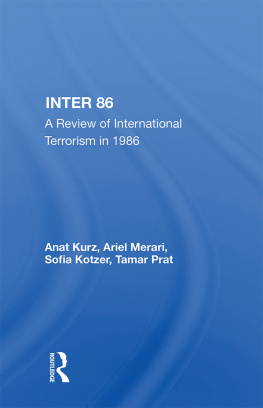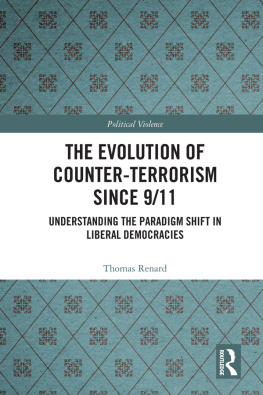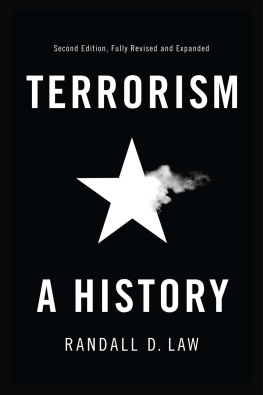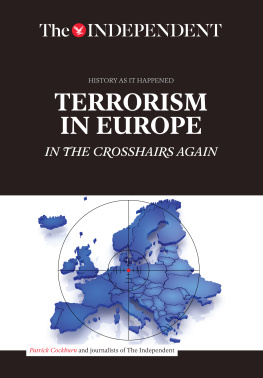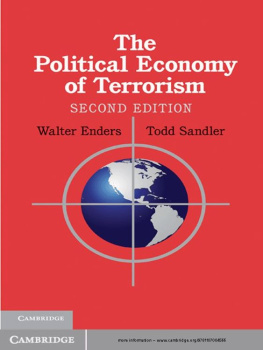INTERNATIONAL TERRORISM: CHALLENGE AND RESPONSE
International Terrorism: Challenge and Response
Editor
Benjamin Netanyahu
The Jonathan
Institute Jerusalem
First published 1981 by Transaction Publishers
Published 2017 by Routledge
2 Park Square, Milton Park, Abingdon, Oxon OX14 4RN
711 Third Avenue, New York, NY 10017, USA
First issued in hardback 2017
Routledge is an imprint of the Taylor & Francis Group, an informa business
Copyright 1981 by The Jonathan Institute
All rights reserved. No part of this book may be reprinted or reproduced or utilised in any form or by any electronic, mechanical, or other means, now known or hereafter invented, including photocopying and recording, or in any information storage or retrieval system, without permission in writing from the publishers.
Notice:
Product or corporate names may be trademarks or registered trademarks, and are used only for identification and explanation without intent to infringe.
Library of Congress Catalog Number: 83-101603
ISBN 13: 978-1-138-52627-3 (hbk)
ISBN 13: 978-0-87855-894-0 (pbk)
The Jerusalem Conference on International Terrorism
The Jerusalem Conference on International Terrorism was convened by the Jonathan Institute to focus public attention on the real nature of international terrorism, on the threat it poses to all democratic societies, and on the measures necessary for defeating the forces of terror.
Editors Note
Most of the addresses at the Jerusalem Conference were submitted in written form. For those of the participants who did not submit papers, the text is based on the transcript of their spoken remarks. The speakers alone must be held responsible for all statements included in these addresses.
CONTENTS
Professor B. Netanyahu, Chairman
Shimon Peres, M.K.
Paul Johnson
Hugh Fraser, M.P.
Senator Henry M. Jackson
Prime Minister Menachem Begin
Ambassador Chaim Herzog, Chairman
Professor Richard Pipes
Brian Crozier
Maj. Gen. Aharon Yariv
Lord Chalfont
Dr. Ray S. Cline
Ambassador Gideon Rafael, Chairman
Senator John C. Danforth
David Barrett
Robert Moss
Professor Mordecai Abir
Professor Edward Teller
Professor Thomas C. Schelling
Ambassador Asher Ben-Natan, Chairman
Joop den Uyl, M.P.
Professor Annie Kriegel
Frank Cluskey, M.P.
Representative Jack Kemp
Piero Luigi Vigna
Bayard Rustin
George Will
Gerhard Lwenthal
Michael Elkins
Norman Podhoretz
Midge Decter
Ben Wattenberg
Jacques Soustelle
Justice Meir Shamgar, Chairman
Merlyn Rees, M.P.
Harry van den Bergh, M.P.
Mordecai Ben-Ari
Professor Joseph W. Bishop
Dr. Hans Josef Horchem
Ambassador Manlio Brosio
Eric Blumenfeld, Member of Bundestag
Lord Chalfont, Chairman
Lane Kirkland, President, AFL-CIO
Ambassador George Bush
Maj. Gen. George J. Keegan, Jr.
Maj. Gen. Shlomo Gazit
Vladimir Bukovsky
The Jerusalem Conference on International Terrorism was convened by The Jonathan Institute on July 25, 1979 to focus public attention on the grave threat that international terrorism poses to all democratic societies, to study the real nature of todays terrorism, and to propose measures for combatting and defeating the international terror movements.
Over the last decade terrorist activities grew tenfold and the arsenal available to terrorists has greatly improved. The current threat promises to become intolerable when terrorists gain access as they show every sign of doing to weapons of mass destruction, or when they gain control of whole peoples and governments and establish themselves as de facto terrorist states.
It was the intolerable spectacle of legitimization of terror groups and the frequent capitulation to their demands that made the Jerusalem Conference so necessary. The United Nations has proven itself to be hopelessly incapable of dealing with the problem. The Western governments themselves have too often tried to make their separate deals, fearing that a full fledged battle against terrorists and their supporters could have negative economic or political consequences.
In the face of such paralysis, pusillanimity and impotence, the Jerusalem Conference was convened to begin the formation of an anti-terror alliance in which all the democracies of the West must join.
It was important to consider in a public forum the questions that must be answered. What are the real forces behind the alarming growth of international terrorism? Which, if any, organizations? What has been the current response of the democratic governments to the terrorist threat? What future dangers are likely to arise? Do the media of the West collaborate, however unwittingly, with the terrorists themselves? Sessions of the Conference were devoted to each of these questions.
Only by discussing in an open forum the full nature of the terrorist threat and the proper response to it can we create in free societies a united public stand against terrorism. Without this, the political use of terror will continue to spread with disastrous consequences for all free societies.
The proceedings of the Jerusalem Conference on terrorism contain such a discussion. The participants at this Conference represent a broad range of political opinion in the democratic world. Nevertheless, the consensus that emerged in the course of the deliberations concerning the causes of terrorism, its backers and promoters, and the means necessary to block and defeat it, left no room for equivocation. It constituted a message that could not be ignored and whose echoes keep reverberating around the world. As several influential commentators have noted, the Conference marked a turning point in the worlds understanding of the problem of terrorism and what has to be done about it.
The Editor
Opening Session
Subject:
Evening, July 2, 1979*
Chairman: Professor Benzion Netanyahu
The speeches delivered at the Opening Session of the Jerusalem Conference presented the major themes of all subsequent discussions: The moral intolerability of terrorism, its natural connection with other forms of tyranny, and its use by anti-democratic states.
It was noted that the present dangers hint at the threat of still more terrible things to come, and establish the need, as the opening speaker put it, for rallying the democracies of the world to a struggle against terrorism and the dangers it represents. As some nowadays satisfy themselves with the easy moral relativism of One mans terrorist is another mans freedom fighter, it was important to establish at the outset the fact that a clear definitional framework exists, regardless of political view. Terrorism the deliberate and systematic killing of civilians so as to inspire fear was shown persuasively to be, beyond all nuance and quibble, a moral evil, infecting not only those who commit such crimes, but those who, out of malice, ignorance, or simple refusal to think, countenance them. The means and ends of terror groups, it was suggested, are indissolubly linked, and both point to a single direction: An abhorrence of freedom and a determination to destroy the democratic way of life.

